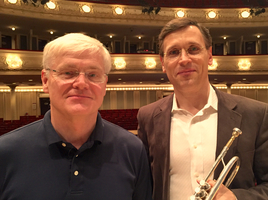
Photo credit: Patrick Godon
Last fall, after months of difficult negotiations and playing without a contract for the first two weeks of the season, the musicians of the Chicago Symphony Orchestra (CSO) came to an agreement with the Chicago Symphony Orchestra Association (CSOA) on a new three-year contract. These negotiations were our first with Kevin Case (now ICSOM Counsel) representing us. His depth of knowledge and experience was a real strength. We also had incredible support from our Local 10-208, Chicago Federation of Musicians, and its President, Gary Matts.
In the current climate of uneasy donors, management upheavals, and the relentless propaganda about the demise of “classical music”, a lockout or strike would have been devastating for the organization and the orchestra. Compromise is never easy, but in this case, when faced with the alternative, compromise was essential. We applaud our employer for also realizing this fact.
One area of compromise was in our health care benefits, which have been a source of contentious conflict in past negotiations. The CSO Members Committee had been monitoring our health care costs continuously over the last several years and knew that those costs had not increased nearly as much as the Association had projected. In order to defuse a traditionally difficult issue, both sides agreed to hire a health care consultant prior to beginning negotiations.
The consultant, who has been used by at least one other ICSOM orchestra, analyzed our experience (use of the plan), costs, benefits, and administrative fees. His final report concluded we were doing well, and that further savings could not be achieved without gutting benefits. He also put the “Cadillac tax” (a part of the Affordable Care Act) into perspective, revealing it would have no impact during the term of this contract. We also discovered that we were not being offered benefits that were contracted with the insurance company that administers our self-insured plan.
Largely because of the fact that both sides were willing to work with an impartial consultant, the CSOA ultimately withdrew its proposals for cost savings and the musicians also agreed to withdraw our small number of health care proposals. Needless to say, everyone was relieved that health care was not a major obstacle within these negotiations.
Two other major factors led to an agreement. The first came from our Music Director. Though not involved in a material way with the negotiations, CSO Music Director Riccardo Muti is a brilliant advocate for the value and integrity of the CSO. His comments from the stage, in the press, and to the musicians, show deep passion for our profession and art, and formed an argument that effectively countered negative gloom and doom. He played a very crucial role, and we are extremely grateful for his help.
The other factor was the work of Javier Ramirez, the Federal Mediator assigned to our negotiations. His help was invaluable, especially at the very end. He sensed how the small differences in each side’s proposals masked a deep philosophical schism, not just between employer and employee, but in understanding this art form and how to nurture and sustain it. This showed remarkable sensitivity and intelligence. As an example of our tax dollars at work, we say “Bravo!”.
The musicians of the Chicago Symphony Orchestra also showed incredible strength and unity during these negotiations. As a result of our preparations, our members have become much more self aware as an orchestra. We have created our own website, Facebook page, and formed our own 501(c)(3) organization. Plans are now underway for a concert to benefit a wonderful Chicago charity—all produced by the musicians. CSO musicians have always been active in our city, musically and otherwise. Our goal moving forward is to demonstrate with our own voices our essential place within the Chicagoland community.





